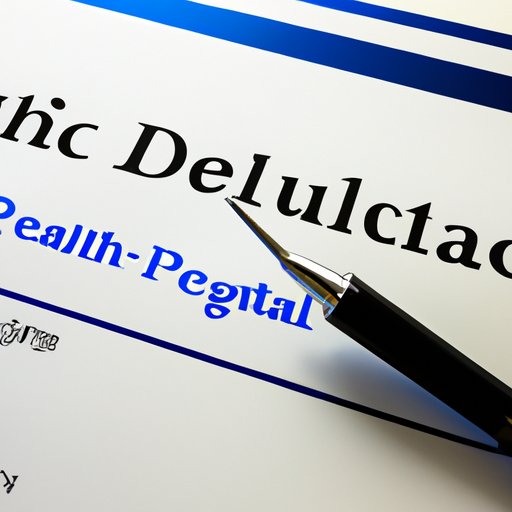Introduction
High deductible health plans (HDHPs) are a type of health insurance plan that requires consumers to pay a certain amount of money out-of-pocket before their insurance coverage kicks in. HDHPs have become increasingly popular in recent years as a way for consumers to save money on their health care costs. But are these plans really a good deal for consumers? This article will explore the pros and cons of HDHPs, their impact on healthcare spending, and how they compare to other types of insurance coverage.

Analyzing the Pros and Cons of High Deductible Health Plans
HDHPs offer several potential advantages for consumers, including cost savings, access to care, and increased consumer engagement in health care decisions. However, there are also some drawbacks to these plans that should be considered. Let’s take a closer look at each of these benefits and drawbacks in turn.
Cost Savings
One of the biggest benefits of HDHPs is that they can help consumers save money on their health care costs. Since HDHPs require consumers to pay a higher deductible before their insurance coverage kicks in, consumers are incentivized to make smarter, more cost-effective decisions about their health care. This can lead to both short-term and long-term savings for consumers.
Access to Care
Another potential benefit of HDHPs is that they can provide improved access to care for consumers. Since HDHPs typically come with lower premiums than other types of health insurance plans, they can be more affordable for consumers who may not be able to afford traditional health insurance plans.
Consumer Behavior
A third potential benefit of HDHPs is that they can encourage consumers to become more engaged in their health care decisions. Since HDHPs require consumers to pay more out-of-pocket for their health care, they are more likely to research their options and consider the cost-effectiveness of different treatments. This can lead to better health outcomes in the long run.
Drawbacks
While there are several potential benefits to HDHPs, there are also some drawbacks to consider. One of the biggest drawbacks is that HDHPs can be unaffordable for some consumers. Since HDHPs require consumers to pay a higher deductible before their insurance coverage kicks in, they may not be a good option for those who cannot afford to pay the upfront cost.
Investigating the Impact of High Deductible Health Plans on Healthcare Spending
In addition to the potential benefits and drawbacks of HDHPs, it’s important to consider the impact these plans have on healthcare spending. Let’s take a closer look at the cost savings associated with HDHPs and how they affect overall healthcare spending.
Examining the Cost Savings Associated with High Deductible Health Plans
HDHPs can help consumers save money on their health care costs by requiring them to pay a higher deductible before their insurance coverage kicks in. This encourages consumers to make more cost-effective decisions about their health care, which can lead to both short-term and long-term savings. Studies have found that HDHPs can lead to a reduction in unnecessary or low-value care, resulting in cost savings for both consumers and insurers.
Evaluating the Impact on Healthcare Spending
In addition to the cost savings associated with HDHPs, it’s important to consider the overall effect these plans have on healthcare spending. Studies have found that while HDHPs can reduce unnecessary or low-value care, they can also lead to reductions in necessary care due to cost concerns. This can result in increases in overall healthcare spending as patients forego needed care due to financial constraints.

Exploring How High Deductible Health Plans Affect Consumer Behavior
In addition to their impact on healthcare spending, it’s also important to consider how HDHPs affect consumer behavior. Let’s take a closer look at the impact these plans have on consumer decisions and how deductible amounts influence consumer behavior.
Impact on Consumer Decisions
HDHPs can have a significant impact on consumer decisions about health care. Since HDHPs require consumers to pay a higher deductible before their insurance coverage kicks in, they are more likely to research their options and consider the cost-effectiveness of different treatments. This can lead to more informed health care decisions and better health outcomes in the long run.
Influence of Deductible Amounts
The amount of the deductible also plays an important role in determining how HDHPs affect consumer behavior. Studies have found that higher deductibles can lead to greater cost savings, but they can also lead to reductions in necessary care due to cost concerns. As such, it’s important to consider the impact of deductible amounts when deciding whether an HDHP is right for you.

Determining if High Deductible Health Plans Lead to Better Health Outcomes
Finally, it’s important to consider whether HDHPs actually lead to better health outcomes. Let’s take a closer look at how HDHPs compare to non-HDHPs in terms of health outcomes and the effects these plans have on quality of care.
Comparing Health Outcomes Between High Deductible and Non-High Deductible Plans
Studies have found that HDHPs can lead to improved health outcomes compared to non-HDHPs. This is likely due to the fact that HDHPs encourage consumers to become more engaged in their health care decisions, leading to more informed decisions and better health outcomes.
Examining Effects on Quality of Care
It’s also important to consider the effects HDHPs have on the quality of care. Studies have found that HDHPs can lead to reduced utilization of high-value services, such as preventative care and screenings. This can lead to poorer health outcomes in the long run, so it’s important to consider the impact of HDHPs on quality of care when deciding whether these plans are right for you.
Comparing High Deductible Health Plans to Other Types of Insurance Coverage
In addition to considering the pros and cons of HDHPs, it’s also important to compare these plans to other types of insurance coverage. Let’s take a closer look at the costs and benefits of various plan types and how they compare in terms of availability.
Examining Costs and Benefits of Various Plan Types
When comparing HDHPs to other types of insurance coverage, it’s important to consider the costs and benefits of each plan type. Traditional health insurance plans tend to have higher premiums but lower deductibles, while HDHPs have lower premiums but higher deductibles. It’s important to consider the costs and benefits of each plan type when deciding which one is right for you.
Assessing Availability of Different Plans
In addition to the costs and benefits of different plan types, it’s also important to consider the availability of different plans. While HDHPs are widely available, other types of health insurance plans may not be as accessible. It’s important to consider the availability of different plans when deciding which one is right for you.
Conclusion
In conclusion, HDHPs can be a good option for consumers looking to save money on their health care costs. These plans can provide cost savings, improved access to care, and increased consumer engagement in health care decisions. However, it’s important to consider the drawbacks of HDHPs, such as the potential for reduced necessary care due to cost concerns, as well as how these plans compare to other types of insurance coverage. Ultimately, it’s up to each individual consumer to decide which type of plan is best for them.
Summary of Findings
This article has explored the pros and cons of high deductible health plans, their impact on healthcare spending and consumer behavior, and how they compare to other types of insurance coverage. HDHPs can provide cost savings, improved access to care, and increased consumer engagement in health care decisions. However, it’s important to consider the potential drawbacks of HDHPs, such as the potential for reduced necessary care due to cost concerns, as well as how these plans compare to other types of insurance coverage before deciding which plan is right for you.
Recommendations for Consumers
When deciding whether a high deductible health plan is right for you, it’s important to consider the costs and benefits of the plan, the availability of different plans, and the potential impacts on healthcare spending and consumer behavior. It’s also important to compare HDHPs to other types of insurance coverage to determine which plan is best for you. Ultimately, the decision of which plan to choose will depend on your individual needs and preferences.
(Note: Is this article not meeting your expectations? Do you have knowledge or insights to share? Unlock new opportunities and expand your reach by joining our authors team. Click Registration to join us and share your expertise with our readers.)
